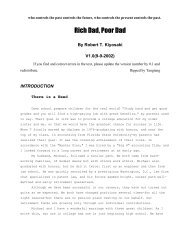Rich Dad, Poor Dad
Create successful ePaper yourself
Turn your PDF publications into a flip-book with our unique Google optimized e-Paper software.
who controls the past controls the future, who controls the present controls the past.<br />
and raises. It was flattering, but I could hear my rich dad asking me in my ear:<br />
"Who are you working for? Who are you making rich?"<br />
In 1974, while still an employee for Xerox, I formed my first corporation<br />
and began "minding my own business." There were already a few assets in my asset<br />
column, but now I was determined to focus on making it bigger. Those paychecks<br />
with all the deductions made all the years of my rich dad's advice make total<br />
sense. I could see the future if I followed my educated dad's advice.<br />
Many employers feel that advising their workers to mind their own business<br />
is bad for business. I am sure it can be for certain individuals. But for me,<br />
focusing on my own business, developing assets, made me a better employee. I now<br />
had a purpose. I came in early and worked diligently, amassing as much money as<br />
possible so I could begin investing in real estate. Hawaii was just set to boom,<br />
and there were 4 fortunes to be made. The more I realized we were in the<br />
beginning stages of a boom, the more Xerox machines I sold. The more I sold, the<br />
more money I made, and, of course, the more deductions there were from my<br />
paycheck. It was inspiring. I wanted out of the trap of being an employee so<br />
badly that I worked harder, not less. By 1978,I was consistently one of the top<br />
five salespeople in sales, often No. 1. I badly wanted out of the rat race.<br />
In less than three years, I was making more in my own little corporation,<br />
which was a real estate holding company, than I was making at Xerox. And the<br />
money I was making in my asset column, in my own corporation, was money working<br />
for me. Not me pounding on doors selling copiers. My rich dad's advice made<br />
much more sense. Soon the cash flow from my properties was so strong that my<br />
company bought me my first Porsche. My fellow Xerox salespeople thought I was<br />
spending my commissions. I wasn't. I was investing my commissions in assets.<br />
My money was working hard to make more money. Each dollar in my asset<br />
column was a great employee, working hard to make more employees and buy the<br />
boss a new Porsche with before-tax dollars. I began to work harder for Xerox.<br />
The plan was working, and my Porsche was the proof.<br />
By using the lessons I learned from my rich dad, I was able to get out of<br />
the "proverbial rat race" of being an employee at an early age. It was made<br />
possible because of the strong financial knowledge I had acquired through these<br />
lessons. Without this financial knowledge, which I call financial IQ, my road to<br />
financial independence would have been much more difficult. I now teach others<br />
through financial seminars in the hope that I may share my knowledge with them.<br />
Whenever I do my talks, I remind people that financial IQ is made up of<br />
knowledge from four broad areas of expertise.




